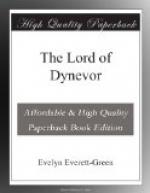“Are both your parents dead, then?” asked Gertrude, with sympathy in her eyes. “I heard that Res Vychan was no longer living, but I knew not that the gentle Lady of Dynevor had passed away also.”
Wendot’s face changed slightly as he answered:
“They both died within a few days of each other the winter after you had been with us, Lady Gertrude. We were visited by a terrible sickness that year, and our people sickened and died in great numbers. Our parents did all they could for them, and first my father fell ill and died, and scarce had the grave closed over him before our mother was stricken, and followed him ere a week had passed. Griffeth was also lying at the point of death, and we despaired of his life also; but he battled through, and came back to us from the very gates of the grave, and yet methinks sometimes that he has never been the same since. He shoots up in height, but he cannot do the things he did when he was two years younger.
“What think you of him, sweet Lady Gertrude? Is he changed from what he was when last you saw him, ere the sickness had fastened upon him?”
Several eyes were turned towards the slim, tall figure of the Welsh lad leaning against the embrasure of the window. The sunlight fell full upon his face, showing the sharpness of its outlines, the delicate hectic colouring, the tracery of the blue veins beneath the transparent skin. And just the same transparent look was visible in the countenance of the young Prince Alphonso, who was talking with the stranger youth, and more hearts than that of Wendot felt a pang as their owners’ eyes were turned upon the pair beside the sunny window. But Wendot pressed for no answer to his question, nor did Gertrude volunteer it; she only asked quickly:
“Then Griffeth and you live yet at Dynevor, beautiful Dynevor, and Llewelyn and Howel elsewhere?”
“Ay, at Carregcennen. We have our respective lands, though we are minors yet; and our kinsman Meredith ap Res is our guardian, though it is little we see of him.”
“Meredith ap Res! I know him well,” cried a girlish voice, in accents which betrayed her Welsh origin. “He has ever been a traitor to his country, a traitor to all who trust him; a covetous, grasping man, who will clutch at what he can get, and never cease scheming after lands and titles so long as the breath remains in him.”
They all turned to see who had spoken, and Arthyn — the headstrong, passionate, patriotic Arthyn, who, despite her love for her present companions, bitterly resented being left a hostage in the hands of the English king — stood out before them, and spoke in the fearless fashion which nobody present resented.




